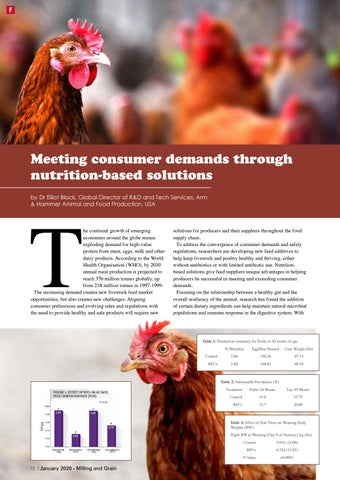F
Meeting consumer demands through nutrition-based solutions
T
by Dr Elliot Block, Global Director of R&D and Tech Services, Arm & Hammer Animal and Food Production, USA
he continual growth of emerging economies around the globe means exploding demand for high-value protein from meat, eggs, milk and other dairy products. According to the World Health Organisation (WHO), by 2030 annual meat production is projected to reach 376 million tonnes globally, up from 218 million tonnes in 1997-1999. The increasing demand creates new livestock feed market opportunities, but also creates new challenges. Aligning consumer preferences and evolving rules and regulations with the need to provide healthy and safe products will require new
solutions for producers and their suppliers throughout the food supply chain. To address the convergence of consumer demands and safety regulations, researchers are developing new feed additives to help keep livestock and poultry healthy and thriving, either without antibiotics or with limited antibiotic use. Nutritionbased solutions give feed suppliers unique advantages in helping producers be successful in meeting and exceeding consumer demands. Focusing on the relationship between a healthy gut and the overall resiliency of the animal, research has found the addition of certain dietary ingredients can help maintain natural microbial populations and immune response in the digestive system. With
Table 1: Production summary for flocks at 45 weeks of age % Mortality
Egg/Hen Housed
Case Weight (lbs)
Control
2.86
159.36
47.35
RFCs
1.82
168.85
48.95
Table 2: Salmonella Prevalence (%) Treatment
Pullet 16 Weeks
Lay 45 Weeks
Control
19.9
33.75
RFCs
15.7
20.00
Table 3: Effect of Sow Diets on Weaning Body Weights (BW) Piglet BW at Weaning (Day 0 of Nursery), kg (lbs) Control
5.91b (13.00)
RFCs
6.32a (13.92)
P-Value
52 | January 2020 - Milling and Grain
<0.0001
